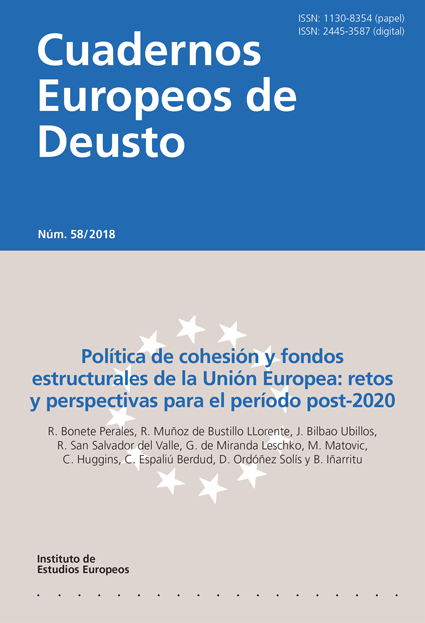European Union structural funds and cohesion policy: challenges and prospects for the post-2020 period
Abstract
With an endowment of EUR 351,800 million in the current 2014- 2020 multiannual financial framework, the European Union (EU) cohesion policy is currently undergoing a revision process with a view to its redefinition in the next, post-2020 financial framework. Negotiation on this new funding horizon faces several challenges, such as the United Kingdom’s exit from the EU, one of the biggest contributors to the EU budget, the migratory crisis and the EU’s external security. The future of the cohesion policy will depend on the results of those negotiations. Some concrete proposals are already envisioned, such as the simplification of the administrative bureaucracy or the better use and management of financial tools. The contributions of this special issue of Cuadernos Europeos de Deusto address some of these challenges and perspectives that are cur rently being discussed about the EU's cohesion policy while providing different elements for further analysis and reflection on its future evolution.
Published online: 28 March 2018
Downloads
The author grants to the Publisher the distribution, public communication, and reproduction rights of her/his work subject of publication in Deusto Journal of European Studies (DJES), whichever the media may be, including the permission to include it in the databases where this Journal is indexed and in the institutional repository of the Universidad de Deusto.
Upon its publication, the content of any Issue of Deusto Journal of European Studies (DJES) can be accessed, read, downloaded, copies, and distributed freely for non-commercial purposes and in accordance with any applicable copyright legislation.
The content of Deusto Journal of European Studies (DJES) can be subsequently published in other media or journals, as long as the author clearly indicates in the first footnote that the work was published in Deusto Journal of European Studies (DJES) for the first time, indicating the Issue number, year, pages, and DOI (if applicable). Any other use of its content in any medium or format, now known or developed in the future, requires prior written permission of the copyright holder.
The content of the work published in Deusto Journal of European Studies (DJES) is each author's sole responsibility. The authors assume the responsibility of obtaining all the necessary licenses for the reproduction in their manuscripts of any text, material or illustration coming from another author, institution or publication. The liabilities that may arise from complaints for publishing plagiarised articles are the sole responsibility of the author.


3.jpg)
2.jpg)
2.jpg)
2.jpg)
2.jpg)
2.jpg)







